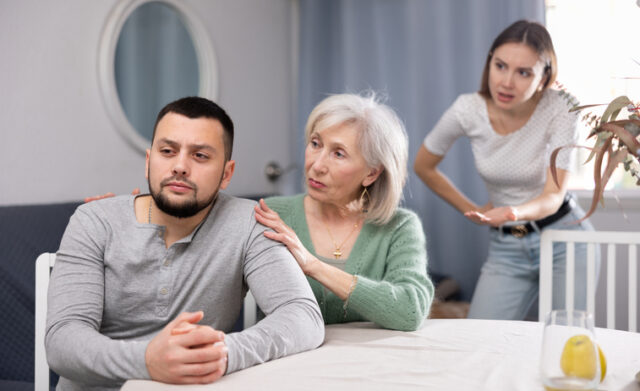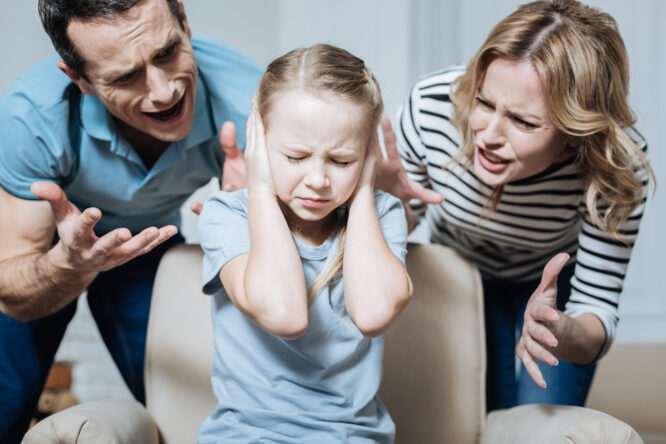When you’re the one holding it all together all the time, it can be hard to even notice just how much weight you’re carrying.

Being the emotional backbone of your family often feels normal, especially when that’s the dynamic that’s always been in place. However, in the end, it inevitably starts feeling impossibly heavy. Here are some signs you might be carrying the emotional weight for everyone around you. If these experiences feel all too familiar to you, it’s time for a serious conversation with your loved ones, as well as some real changes.
You’re always the one checking in on everyone.

If you’re the one constantly sending messages, making calls, or planning catch-ups just to make sure everyone’s okay, it’s a sign you’re carrying more than your share. While it’s natural to care about your family, when you’re always the one initiating support and conversations, it can feel exhausting after a while. It’s like you’re the emotional glue, keeping everyone connected, even when no one else seems to notice or return the effort.
That responsibility can slowly become a silent burden, especially if it’s expected rather than appreciated. You might start to notice that if you stopped reaching out, some relationships would quietly fall apart. It’s a lonely feeling, but it’s also a huge indicator that you’re the one doing the emotional heavy lifting without much help in return.
You feel responsible for everyone’s happiness.

When your family members are upset or struggling, do you feel like it’s your job to fix it? Feeling responsible for how everyone feels can be a major sign that you’re carrying emotional weight that doesn’t actually belong to you. It’s an impossible task, but that doesn’t stop you from trying your hardest to keep everyone smiling.
Eventually, that pressure can leave you feeling drained and anxious. You might second-guess yourself constantly, wondering if you could have said or done more. It’s a heavy burden to believe that everyone’s happiness hinges on your actions, and it’s one that can quickly lead to emotional burnout if you’re not careful.
Family members turn to you first with their problems.

When there’s a crisis, an argument, or even just a bad day, you’re the first person everyone calls. While being trusted is a compliment in some ways, it can also be overwhelming when it feels like you’re the default support system for every emotional need. It puts you in a constant state of alert, never fully able to relax.
It can be even harder if no one stops to ask how you’re doing in return. As time goes on, that imbalance can leave you feeling used, even by people you love. You might find yourself dreading your phone lighting up, knowing another emotional burden is about to be dropped in your lap without anyone offering to share yours.
You downplay your own struggles to keep the peace.

If you often hide your own feelings because you don’t want to upset anyone else, that’s a strong sign you’re carrying too much. You might find yourself saying you’re “fine” even when you’re not, simply because you don’t want to add to anyone else’s stress. Keeping the peace becomes more important than being honest about your own pain.
While that instinct is understandable, it leaves your needs unmet and creates an emotional one-way street. You end up suffering in silence while other people get the space to process their emotions freely. In the end, it can lead to deep resentment, especially if you realise that no one seems to notice (or care) that you’re quietly struggling too.
You feel guilty when you set boundaries.

Setting boundaries is healthy, but when you’re the emotional anchor for your family, it can feel incredibly difficult. You might feel selfish or cold for saying no, even when you know it’s necessary for your mental and physical health. The guilt can be overwhelming, convincing you that you’re letting everyone down by prioritising yourself.
That kind of guilt usually stems from a long history of being the reliable one—the one who never says no. Still, carrying the weight of everyone’s emotions is unsustainable without healthy limits. Learning to set boundaries without drowning in guilt is often one of the hardest but most freeing steps you can take.
Family drama stresses you out more than it should.

It’s normal to feel upset when your family argues or faces problems, but if you find yourself overly stressed or personally affected by every disagreement, it’s a red flag. You might feel like it’s your job to mediate, smooth things over, or absorb everyone’s hurt so no one else has to deal with it.
Taking on that emotional responsibility can feel noble in the moment, but it leaves you carrying burdens that aren’t truly yours to fix. After a while, it can make family gatherings feel draining instead of joyful, and you might start dreading events that should be filled with connection and warmth.
You always put everyone else’s needs ahead of your own.

If you’re constantly putting your own feelings, needs, or plans on the back burner to accommodate everyone else, it’s another major sign you’re shouldering the emotional load. You might justify it by telling yourself they need you more or that your problems can wait, but somehow, your needs always seem to end up last.
That self-sacrificing pattern might feel like love, but it’s often rooted in unhealthy dynamics. When you continually deprioritise yourself, resentment can creep in, even if you don’t want it to. You deserve the same care and consideration that you freely give to everyone else, and recognising that is the first step toward lightening your load.
You rarely feel emotionally supported in return.

One of the clearest signs you’re carrying the emotional weight is that you rarely, if ever, feel like anyone is holding space for you. You might listen endlessly to other people’s problems, but when you need someone to lean on, there’s a noticeable absence. It’s lonely and frustrating, even if you don’t admit it out loud.
Eventually, that one-sided support dynamic can destroy your sense of trust and safety within your family. It can make you question whether you’re loved for who you are or simply for the role you play. It’s a painful realisation, but an important one if you’re going to start building healthier, more reciprocal relationships.
You constantly feel emotionally exhausted.

When you’re carrying everyone else’s emotions, it’s no surprise that you often feel drained. Emotional exhaustion isn’t just about being tired. It’s a deep, bone-weary feeling that no amount of sleep seems to fix. You might wake up already dreading the day, knowing how much emotional labour lies ahead.
That chronic depletion is your body and mind waving red flags. Emotional exhaustion can lead to burnout, anxiety, and even physical health problems if left unchecked. Recognising that you’re not just “being dramatic”—you’re genuinely overwhelmed—is crucial to starting the process of putting down some of that weight.
You feel like you can never really relax.

If you find yourself constantly “on,” waiting for the next crisis or emotional emergency, it’s a strong indicator that you’re carrying too much. Relaxation starts to feel impossible because you’re always emotionally braced, ready to jump in and fix things at a moment’s notice.
Living in a state of emotional hypervigilance is exhausting. It keeps you from fully enjoying the peaceful, quiet moments because you’re always half-expecting something to go wrong. Learning to let go, even just a little, and trust that not every problem is yours to solve is a must if you want to reclaim your emotional balance.
You’re seen as the ‘strong one’ but it doesn’t feel like a compliment.

Being called the strong one sounds flattering, but when it becomes your whole identity, it can feel like a prison. Everyone expects you to be unshakeable, which means there’s no room for your own vulnerability, fear, or sadness. It’s isolating to always be the one everyone leans on without ever being able to lean yourself.
Over time, the label of “strong” can start to feel heavy rather than empowering. It can trap you in a role where asking for help feels like failure. Remember, real strength isn’t about carrying everything alone. It’s about recognising when you need support too and being brave enough to ask for it.
You notice resentment building, even if you try to suppress it.

No matter how much you love your family, carrying their emotional needs for too long can breed resentment. You might tell yourself it’s selfish to feel that way, but resentment doesn’t make you a bad person, you know. It makes you human. It’s a natural response to chronic imbalance and unmet needs.
Trying to suppress resentment doesn’t make it disappear; it usually just bubbles up in other ways, like irritability, withdrawal, or emotional numbness. Acknowledging your feelings honestly and without judgement is the first step toward making healthier choices for yourself and your relationships.
You feel like everything would fall apart without you.

If you have a nagging fear that your family couldn’t function without you emotionally holding it together, it’s a sign you’re carrying far too much. That belief can feel noble but often hides a lot of pain. It keeps you trapped in a cycle where you feel indispensable, but also unseen and exhausted.
The truth is, while you play an important role, it’s not your job to keep everyone afloat single-handedly. Letting go doesn’t mean abandoning your family; it means trusting them to take responsibility for their own mental and emotional health, too. You deserve to be part of the family, not the foundation it’s unfairly built on.




